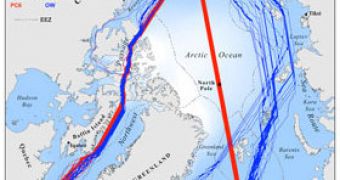According to a new research whose findings were published earlier this week in the journal Proceedings of the National Academy of Sciences, global warming and climate change will soon make it possible for various ships to sail straight across the North Pole.
For the time being, such sea lanes are off limits, simply because of the ice covering this part of the Arctic.
However, as global average temperatures will continue to increase, the Arctic sea ice is bound to become ever thinner, thus allowing ships to tackle sailing routes they would have previously been unable to handle.
Mongabay informs us that, although the rapidly melting sea ice in the Arctic region will translate into a speeding up of the transit between northern Asia, Europe, Canada and Alaska, the fact remains that these new sea lanes will also bring forth new environmental and legal concerns.
The scientists who pieced together this report concerning the effects of climate change and global warming on the sailing lanes in the Arctic region wished to emphasize the fact that, melting of the sea ice aside, these new sea lanes will not be available all year-round.
Still, their soon becoming available for several months in a row means that high officials must do their best in regulating their use.
“We're talking about a future in which open-water vessels will, at least during some years, be able to navigate unescorted through the Arctic, which at the moment is inconceivable. Nobody's ever talked about shipping over the top of the North Pole,” argued specialist Laurence C. Smith.
“While attractive to business, the lack of regulations poses safety, environmental and legal issues that have yet to be resolved. The prospect of open-water ships entering the Arctic Ocean in late summer heightens the urgency for comprehensive international regulations that provide adequate environmental protections, vessel safety standards and search-and-rescue capability,” reads the report issued by Laurence C. Smith and his fellow researchers.
Needless to say, this thinning of the Arctic ice will also make it possible for companies to begin extracting various natural resources to which they currently lack access, and odds are environmentalists will not be very pleased about such development plans.

 14 DAY TRIAL //
14 DAY TRIAL //